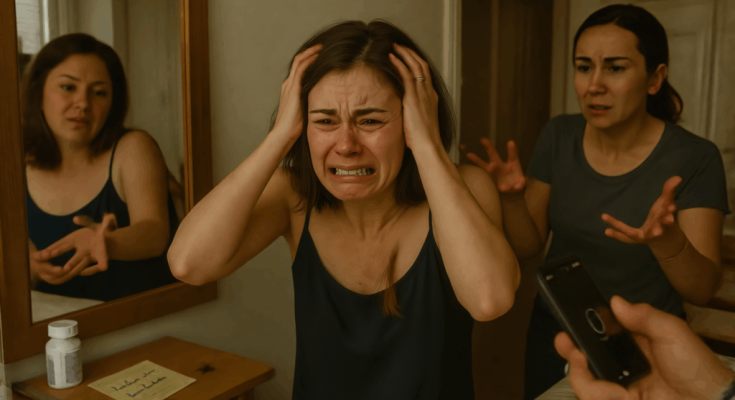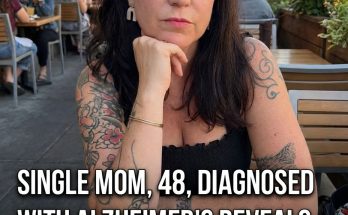I woke up to a sharp, unfamiliar scent and an odd lightness near my neck. My heart skipped when I looked in the mirror—my long, chestnut hair, the one thing I truly took pride in, had been chopped unevenly in my sleep.
Then I saw the note.
It sat beside my mother’s crafting scissors on my desk:
“You’ll still look fine. Focus on your speech for Hannah’s big day.”
I just stood there, staring at the strands scattered across my blanket—like little pieces of me left behind. My sister’s wedding was supposed to be a day to celebrate love and family. For me, it was also a chance to finally be seen. I had chosen a simple yet elegant satin dress, paid for from months of extra shifts. I wanted to show up confident, not overshadowing anyone—just myself, for once.
But now I looked like I had lost a bet.
When I walked into the kitchen, my father barely looked up from his cereal.
“Shorter hair suits you,” he said calmly. “It’s better this way—let your sister shine.”
My mother nodded. “Yes, this day is about Hannah. Let her have her moment.”
They said it like my presence was a distraction, like my confidence was a problem.
To be clear—I was always the responsible child, but never the favorite.
Hannah got the special lessons, the trips, the attention. I got the “be grateful” speeches and hand-me-downs. When she graduated, she went to Paris. When I did, I worked two jobs just to pay for community college.
Still, I said yes to the wedding invitation, hoping maybe this time would be different.
But that night, they made sure I’d stand out for the wrong reason.
When my best friend Becca saw me, she was speechless.
“They really did this while you were asleep?”
I nodded. “They said it’s for Hannah.”
Becca sighed, then smiled. “Then let’s make sure they remember you for who you really are.”
We didn’t plan payback—we planned empowerment. She trimmed my hair into a bold, stylish crop that somehow made me feel stronger. “You look like someone ready to own her story,” she said.
That night, I couldn’t sleep. But by morning, I knew exactly what I needed to do.
At the vineyard venue, everything looked perfect—roses, candles, and smiles. Hannah was glowing, my parents beaming. I was supposed to give a short speech about family and love, carefully written and approved by them.
But when my moment came, I looked around the room and spoke from the heart instead.
“I’ve always admired how families come together to celebrate love. But sometimes, love means letting people be themselves. It means not cutting them down to make others feel taller.”
The room fell silent. My mother’s smile froze. My father shifted in his seat.
I shared what it felt like to grow up being compared, being told to dim my light. I didn’t name names, but everyone understood. I simply ended with, “No one should ever have to shrink to make someone else shine.”
The words weren’t bitter—they were honest. And they landed harder than I ever expected.
The next day, my friend posted a short clip of my speech online with the caption:
“When family tries to dim your light, shine brighter.”
It spread quickly. People related. Comments poured in from strangers thanking me for saying what they’d always felt. Some even called it “a reminder that self-worth doesn’t come from approval—it comes from within.”
Soon after, a lifestyle magazine reached out to feature my story. They titled it, “The Overlooked Sister Who Spoke Up.” It wasn’t about blame—it was about finding confidence after being underestimated.
During the photo shoot, with my new haircut and a soft blue dress, I saw someone I hadn’t seen in years: me—unapologetically confident and free.
Months later, life looked completely different. The video had inspired a wave of conversations about family expectations, comparison, and self-esteem. People began sharing their own stories, and I started speaking at local events about self-worth and identity.
Then came an email from Cynthia Ray, founder of a well-known fashion and empowerment brand. Her message said:
“Your story represents exactly what we stand for. We’d love you to lead a new campaign called You Can’t Cut Confidence.”
It felt surreal—but right.
The campaign launched a few months later, and it was everything I had dreamed of: authentic, inclusive, and uplifting. During the opening event, I stood in front of a crowd of women who had once been told to shrink, and together we celebrated strength, individuality, and growth.
And yes—my parents came. Quiet, unsure, maybe even regretful. My mother murmured, “We’re proud of you.”
I smiled and simply said, “It’s okay. I found pride on my own.”
As they left, I looked around the bright new workspace—my name on the banner, my story behind the message—and I finally understood:
No one can truly take away your light.
They can cut your hair, but not your confidence.
They can try to silence you, but not your spirit.
And when you finally choose to shine—there’s no turning it off.




